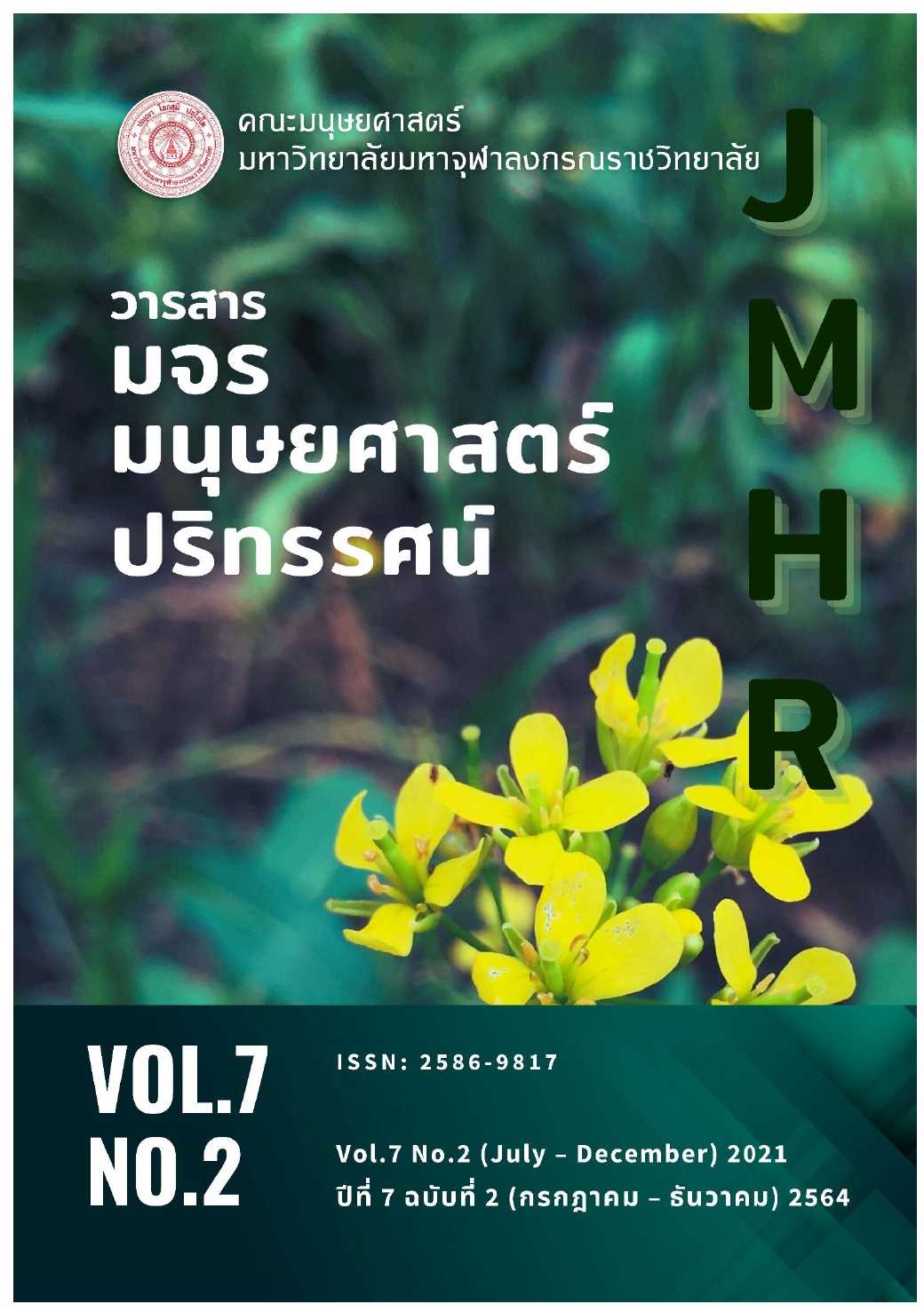สังคหวัตถุ 4 กับความสุขของผู้เคยผ่านปฏิบัติธรรมในสถานปฏิบัติธรรม
คำสำคัญ:
ความสุข, สังคหวัตถุ 4, ปฏิบัติธรรมบทคัดย่อ
การวิจัยครั้งนี้ เป็นการวิจัยเชิงสำรวจ (Survey research) มีวัตถุประสงค์เพื่อศึกษาความสุขของผู้เคยผ่านปฏิบัติธรรมในสถานปฏิบัติธรรม ปัจจัยที่มีความสัมพันธ์และอำนาจในการทำนายความสุขของผู้เคยผ่านปฏิบัติธรรม ได้แก่ เพศ อายุ ระดับการศึกษา รายได้และหลักธรรมสังคหวัตถุ 4 วิธีการเก็บรวบรวมข้อมูล ให้กลุ่มตัวอย่างซึ่งต้องเป็นผู้เคยผ่านปฏิบัติธรรมในวัด หรือสถานปฏิบัติธรรมตอบแบบสอบถามผ่านระบบ Google survey online จำนวน 331 คน แล้วนำข้อมูลมาวิเคราะห์โดยใช้สถิติร้อยละ ค่าเฉลี่ย ส่วนเบี่ยงเบนมาตรฐาน ค่าสัมประสิทธิ์สหสัมพันธ์ของเพียร์สัน และการวิเคราะห์ถดถอยพหุคูณแบบขั้นต้น
ผลการวิจัยครั้งนี้ พบว่า ผู้เคยผ่านปฏิบัติธรรมในสถานปฏิบัติธรรมส่วนใหญ่มีความสุขมาก ระดับคะแนน 4 ขึ้นไป ร้อยละ 92.5 ไม่พบผู้ไม่มีความสุขหรือมีความสุขน้อย คะแนนความสุขรวมเฉลี่ยเท่ากับ 3.86 ปัจจัยที่มีความสัมพันธ์ทางบวกกับความสุขของผู้เคยผ่านปฏิบัติธรรมในสถานปฏิบัติธรรมอย่างมีนัยสำคัญทางสถิติที่ระดับ 0.05 ได้แก่ อายุ รายได้ และหลักธรรมสังคหวัตถุ 4 ของผู้เคยผ่านปฏิบัติธรรม และปัจจัยที่สามารถร่วมทำนายความสุขของผู้เคยผ่านปฏิบัติธรรมในสถานปฏิบัติธรรมได้แก่ อายุ รายได้ และหลักธรรมสังคหวัตถุ 4 โดยทำนายได้ ร้อยละ 31.40
ข้อเสนอแนะจากการวิจัย ในการดูแลผู้ปฏิบัติธรรมให้มีความสุข สถานปฏิบัติธรรมอาจจะจัดรูปแบบการปฏิบัติธรรมและช่องทางที่เอื้อให้ผู้ปฏิบัติธรรมสามารถเข้าถึงได้สะดวกในการปรึกษาข้อธรรม เมื่อพบเจอกับปัญหาหรืออุปสรรคขณะปฏิบัติ และป้องกันการสนทนากันเอง ซึ่งอาจจะทำให้ความสุขด้านการมีศรัทธาต่อการดำเนินชีวิตที่ถูกต้องดีงามลดน้อยลงได้และควรคำนึงถึงหลักธรรมสังคหวัตถุ 4 อายุและรายได้ของผู้ปฏิบัติธรรมร่วมด้วย
เอกสารอ้างอิง
จงจิต เลิศวิบูลย์มงคล. (2546). ความสัมพันธ์ระหว่างปัจจัยส่วนบุคคล การได้รับการเสริมสร้าง พลังอำนาจในงาน แรงจูงใจใฝ่สัมฤทธิ์กับความสุขในการทำงานของพยาบาลประจำการโรงพยาบาลมหาวิทยาลัยของรัฐ (วิทยานิพนธ์พยาบาลศาสตรมหาบัณฑิต). จุฬาลงกรณ์มหาวิทยาลัย. กรุงเทพฯ.
ปภัสสร กิมสุวรรณวงศ์. (2554). การศึกษาวิธีการดูแลสุขภาพแบบองค์รวมของผู้สูงอายุตามแนวคิดทางพระพุทธศาสนา (สารนิพนธ์พุทธศาสตรดุษฎีบัณฑิต). มหาวิทยาลัยมหาจุฬาลงกรณราชวิทยาลัย. พระนครศรีอยุธยา.
พระครูสมุห์ธรรมภณ ธมฺมพโล (แก้วแจ่มศรี). (2554). ทัศนคติทัศนคติต่อความสุขในพระพุทธศาสนาของพุทธศาสนิกชนที่เข้าร่วมกิจกรรมทางศาสนา วัดธรรมิกราช จังหวัดพระนครศรีอยุธยา (วิทยานิพนธ์พุทธศาสตรมหาบัณฑิต). มหาวิทยาลัยจุฬาลงกรณราช วิทยาลัย. พระนครศรีอยุธยา.
พระพรหมคุณาภรณ์ (ป.อ.ปยุตฺโต) (2555). พุทธธรรม ฉบับปรับขยาย (พิมพ์ครั้งที่ 32). กรุงเทพมหานคร: ผลิธัมม์.
พระพรหมคุณาภรณ์ (ป.อ.ปยุตฺโต). (2564). ปฏิบัติธรรมคืออย่างไร. สืบค้น 2 มีนาคม 2564, จาก http://www.dharma-gateway.com/monk/preach/lp-prayuth/lp-prayuth-33.htm.
พระมหาสุชิน สุชีโว (สมบูรณ์สุข) (2546). การศึกษาวิเคราะห์เรื่องหลักการสงเคราะห์ญาติในพระพุทธศาสนาเถรวาท (วิทยานิพนธ์พุทธศาสตรมหาบัณฑิต). มหาวิทยาลัยจุฬาลงกรณราชวิทยาลัย. พระนครศรีอยุธยา.
พระอนันตชัย อภินนฺโท (ขันโพธิ์น้อย). (2563). ปัจจัยที่มีผลต่อความสุขในการทำงานของบุคลากรวิทยาลัยสงฆ์บุรีรัมย์ จังหวัดบุรีรัมย์ (วิทยานิพนธ์พุทธศาสตรมหาบัณฑิต). มหาวิทยาลัยจุฬาลงกรณราชวิทยาลัย. พระนครศรีอยุธยา.
เริงชัย ตันสุชาติ และคณะ. (2551). ดัชนีวัดความสุขและความอยู่ดีมีสุขของชุมชนในมูลนิธิโครงการหลวง (รายงานผลการวิจัย). กรุงเทพฯ: มูลนิธิโครงการหลวง.
Cochran, Robert V., & Morgan, Daryle W.(1970). Determining Sample Size for Research Activities, Educational and Psychological Measurement, 30(3), 608.






